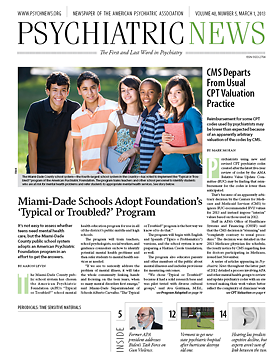Psychiatrists using new and revised CPT psychiatry codes created after the latest five-year review of codes by the AMA Relative Value Update Committee (RUC) may be finding that reimbursement for the codes is lower than anticipated.
That’s because of an apparently arbitrary decision by the Centers for Medicare and Medicaid Services (CMS) to ignore RUC-recommended RVU values for 2013 and instead impose “interim” values based on those used in 2012.
Staff in APA’s Office of Healthcare Systems and Financing (OHSF) said that the CMS decision is “stunning” and “completely contrary to usual procedure.” The decision was detailed in the 2013 Medicare physician fee schedule, the yearly notice by CMS regarding fees for doctors participating in Medicare, issued last November.
A series of articles appearing in Psychiatric News throughout the latter part of 2012 detailed a process involving APA and other mental health groups to review and update psychiatry codes with an eye toward making their work values better reflect the complexity of clinicians’ work with medically complex patients. These changes included changes to the diagnostic evaluation code (90801) to distinguish whether the evaluation included medical work or did not; refinement of psychotherapy codes, keyed to three levels of time spent with the patient and inclusion of “add-on” codes when psychotherapy is provided in conjunction with E/M work (for example, medication management); elimination of the pharmacologic management code (90862) and its replacement with existing E/M codes (99XXX series codes); a new add-on code for “interactive complexity” when the patient encounter is more complex; and a new code for psychotherapy with a patient “in crisis.”
The RUC accepted the new codes and recommended new valuations for the codes. (CMS typically reviews all of the RUC recommendations and publishes a decision with regard to the values in the final rule that comes out each November. A proposed rule on the physician fee schedule is issued in the summer, but these values are never included in that rule. Public comment on the final rule is welcome, but CMS is not bound to respond.)
While there was no guarantee that CMS would adopt the RUC recommendations completely, an increase in reimbursement was anticipated for fees taking effect on January 1 of this year. (Annual updates to the physician work relative values used in the Resource-Based Relative Value Scale for determining physician Medicare fees are based on recommendations from the AMA/Specialty Society Relative Value Scale Update Committee, a committee involving the AMA and national medical specialty societies formed by the AMA to act as an expert panel in developing relative value recommendations to CMS.)
CMS’s stated rationale behind the decision was that the agency would not finalize any of the values until all of the new and revised CPT codes have been surveyed and reviewed by the RUC. But it appears that in an effort to maintain budget neutrality for this year, CMS decided to reduce what it pays out for the practice-expense component for codes billed exclusively by medical professionals, using the rationale that those able to bill evaluation and management (E/M) services would see higher practice-expense payments any time they bill an E/M code. Moreover, the agency has applied this rationale not only to the values for the psychotherapy add-on codes that are billed with E/M codes, but also to the initial diagnostic evaluation (90792), which includes medical services—a service that cannot and should not be billed with an E/M code.
As a result of this formula, the total payment for 90792 under Medicare is less (by about $25) than that for 90791 even though the work is greater, the malpractice liability is greater, and the practice expenses are no less for medical professionals than for mental health clinicians.
Staff in OHSF said this anomaly will likely incentivize people to code differently from what they otherwise should.
According to Becky Yowell, deputy director of the OHSF, the move by CMS came as a surprise not only to APA and other mental health groups involved in the process, but the AMA as well, since the decision not to finalize the values to become effective January 1 is counter to what has occurred with other families of codes that have proceeded through the process in a similar code-by-code manner.
OHSF anticipates that the RUC recommendations for all the codes in the new framework will go forward to CMS in time for the values to be finalized for the 2014 Medicare physician fee schedule. But in the meantime, APA has lodged vigorous complaints with CMS about the discriminatory interim codes.
“We have asked CMS in written communiques and telephone conversations to correct this discrepancy, but to date CMS has stood behind its decision despite the absurdity it has created in valuing a more complex service lower than the same service done without medical services,” Yowell said. “The APA Division of Advocacy is formulating an appropriate strategy, which may include congressional letters, to rectify this.” ■
